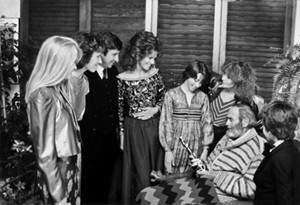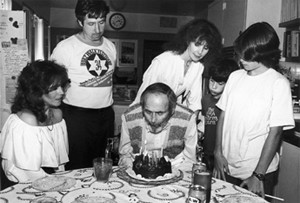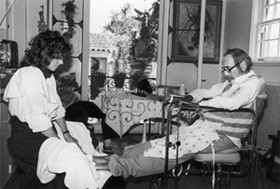My Life So Far (73 page)
Ethel telling Chelsea to talk to her father.
(© Steve Schapiro)

I’ve just brought Dad his Academy Award. Left to right: Bridget Fonda, Amy Fonda, Tom, me, Vanessa, Shirlee, and Troy with his back to the camera.
(© John Bryson, 1982)
That night I asked Dad and Shirlee if I could come over to dinner. The scene had been so utterly personal for me, so intimate in a way that he and I had never been. I was raw and felt so close to him, and I needed to acknowledge it and see if he felt the same. I wanted to tell him how terrifying it had been to dry up like I did, and to ask if this had ever happened to him—at least, you know, share some actor’s talk. But mostly I wanted to know if he had changed in any way as a result of the intimacy.
I told him about drying up and asked if such a thing had ever happened to him.
“Nope.”
I couldn’t believe it. “Never? Not once in your whole career?”
“Nope.”
My heart sank. That was it, just “Nope.” Why did these things happen to me and not to him? What was I doing wrong? Moreover it was all too clear that he was no more open or forthcoming now than he’d been before the scene. I was so sad. I felt like a dope for getting all soft and fuzzy over what to him was obviously just a scene.
Katharine Hepburn told Scott Berg, “Hank Fonda was the hardest nut I ever tried to crack. But I didn’t know any more about him after we had made the picture than I did at the beginning. Cold. Cold. Cold.”
Yup.
O
n the set one day, Ms. Hepburn told our unit publicist that she thought it was the duty of a star to be fascinating. There is no denying that the lady worked hard to do her duty and as a result was one of the two most fascinating people I have known (the other being Ted Turner). But despite this and despite my father’s coldness, in the genetic scheme of things I am glad I am my father’s daughter. I never loved him more than when I watched him, day after day, as he sat on the set between takes in his canvas chair with his name printed on the back panel, waiting to be called before the cameras: quiet, demanding little,
not
looking to fascinate. He was what he was.
On Golden Pond was the largest-grossing film of 1981. The studios were wrong: People
did
want to see this movie about old folks . . . because it spoke of universal issues with pathos and humor. Never has a movie of mine had such a profound personal impact on people; never have people crossed the street just to hug me and tell me that seeing it, and then bringing their fathers to see it, had altered their relationships forever. This has moved me and gladdened me greatly over the years.
The film received
ten
Academy Award nominations, among them Best Picture, Best Actor, Best Actress, Best Supporting Actress, and Best Screenplay. Dad was too ill to attend the ceremony, and given his lifelong antipathy for awards and competition, I’m not sure he would have gone even if he had been well enough. But he intended to watch the proceedings with Shirlee from his bed. Ms. Hepburn did not attend, either. The first one of us to win (for Best Writing, Screenplay Based on Material from Another Medium) was Ernest Thompson, who actually leapt with joy as he crossed the stage. I did not win Best Supporting Actress (losing to the remarkable Maureen Stapleton playing the radical Emma Goldman in
Reds
). Eight-year-old Troy was sitting next to me, and as the names of the nominees for Best Actress were being read, I saw him drop his head and squeeze his eyes tight. When Katharine Hepburn’s name was announced as the winner (for an unprecedented fourth time), Troy tugged excitedly on my arm and whispered, “Mom, I prayed she’d win and my prayer was answered.”
Then Sissy Spacek came out to present the award for Best Actor. For all his great performances, Dad had been nominated only once before, for Tom Joad in
The Grapes of Wrath.
This time he had stiff competition: Warren Beatty, Burt Lancaster, Dudley Moore, and Paul Newman. There was nothing I wanted more in life than for him to finally win. This was my fervent prayer. When Sissy opened the envelope and announced his name, the theater erupted in applause and cheering; I went up onstage to claim the Oscar on his behalf, as he had asked me to in the event he won. It was the happiest moment of my life.
Tom, Troy, Vanessa, and I left the ceremony immediately, along with Amy (the daughter Susan and Dad had adopted at birth) and my niece, Bridget Fonda, to carry the statue to him. He was sitting in his wheelchair next to the bed when we arrived.
Shirlee was right next to him, as always.
Watching his face closely, I could see he was pleased. When I asked him how he felt, all he said was, “I’m so happy for Kate.”
The next morning I called Ms. Hepburn to congratulate her and her first words to me were, “You’ll never catch me now!”
It took a moment for me to understand what she was talking about, and then it hit me. Of course—if she
hadn’t
won and I
had,
we’d be tied with three Oscars each. Now she had four, and I had only two. No way I’d catch up. I had to laugh. We were still operating on different wavelengths, but how could I not love her spunk?
D
ad died five months later.
CHAPTER NINETEEN
CLOSURE
Maybe a fella hasn’t got a soul of his own, just a piece of a big soul—
the one big soul that belongs to everybody.
—T
OM
J
OAD IN
J
OHN
S
TEINBECK’S
The Grapes of Wrath
T
HE END CAME SLOWLY.
Following the filming of
On Golden Pond
and before its release, I visited Dad’s home in Bel-Air as often as I could. There he’d be, sitting in the kitchen in his wheelchair or, more and more frequently, in his bed. Shirlee worked hard to make him look dignified for these visits, dressing him in natty cashmere cardigans. He would be awake but remote, already gone from us on some level. At such times I would sit with Shirlee and make small talk, glancing over at him occasionally, hoping that the inner world into which he seemed to have retreated was filled with curtain calls, tumultuous applause, and visions of the kites that he and Jimmy Stewart had flown as youths.
During this time I enjoyed being able to please him in little ways. I would cook him pork roast and bring him crisp, tart pears from an old pear tree we had at the ranch, things I knew he loved. It’s a strange pleasure—when a parent you have always feared, who has never seemed to need you, becomes old and weak and you are finally able to do for him. Being able to give him the nurture he had not given me filled me with an almost spiritual satisfaction. I wished he were poor and needed me more.

Dad blowing out his seventy-seventh-birthday candles at home. Left to right: me, Tom, Shirlee, Troy, and Vanessa.
(© Suzanne Tenner)

Dad loved me to rub his feet.
(© Suzanne Tenner)
One day I was allowed into the intensive care unit at Cedars-Sinai Medical Center, where he had been rushed during a close call. It was the first time I had seen him like that, all hooked up to IVs and monitors, sunken and pale, with dark bruising on his arms and hands from the needles. He seemed to be asleep, so I pulled up a chair, sat at the end of his bed, lifted the ends of the sheets, and began rubbing his feet. Dad had suffered with painful gout in his feet for as long as I could remember, and I knew gentle massage helped relieve it. I loved being able to touch him like that, even though he was unaware. It created an intimacy, albeit one-way, we’d never had. I must have sat there massaging his beautiful, long, pale feet for twenty minutes; then, fearing I’d overstayed my time, I stood up and got halfway to the door when a weak voice that seemed to come from far away said: “Don’t stop.” He had been awake all along!
There were the times I’d sit by his bedside looking at him, his eyes closed, wondering if he was asleep or just avoiding talking to me. I wanted to ask him if he was in pain, if he’d seen any angels yet, if he could see to the other side, if he was scared. I never did. Shirlee hadn’t allowed any of us to admit he wasn’t going to get better, so we all went around pretending he’d be up and about in no time. I hated it. It all rang so false, but I felt I had to honor her wishes; it was she, after all, who was living through this with him night and day, being the loving caretaker. But I often wondered if it was Dad who needed to believe this or Shirlee. Personally I’d rather know when the jig is almost up so as to be intentional about that last kiss, that final “I love you.” But that’s just me.
Perhaps it didn’t matter and my desire to communicate with him was futile. After all, how could I expect him to do something he’d never done, be someone he’d never been, now at the end? How could I talk to him about feelings now, when it was almost over? Yet I knew he had feelings. I’d seen him laugh hard when he was with his men friends or when he’d had a drink or two. I saw him cry, once—the day Roosevelt died. He was standing in his vegetable garden, and I was very little, and he never saw me there watching.
Another day I went to his home and found him sitting in a chair in his room with a lap rug over his knees. He had been moved into the same downstairs back room where I had lived during the time when I was morphing from Barbarella into an activist, causing him so much angst. From the window he could look out onto his beloved vegetable garden. Shirlee was away on an errand, and I realized that I might not get another chance to tell him how I felt.